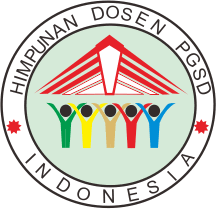Hubungan kemandirian belajar dengan hasil belajar peserta didik
Abstract
This study aims to analyze how big the relationship between the Pancasila Student Profile and student learning outcomes at SD Ta'mirul Islam Surakarta. This research is a correlational quantitative research. The data source for this research was students of class II and III of SD Ta'mirul Islam Surakarta. The sampling technique was carried out by means of random sampling. Data collection was carried out using questionnaires and cognitive test questions. Validity test using content validity test and reliability test with SPSS 24.0. Data analysis consisted of analysis prerequisite tests and hypothesis testing. The analysis prerequisite test consists of a normality test and a linearity test, while the hypothesis test uses a product moment correlation test, and multiple correlation tests. The results of this study are as follows: The results of the independent learning questionnaire amounted to 27 trials carried out by 32 respondents, the validity results obtained were 2 invalid residual questions. In the class 2 cognitive test instrument, there were 15 questions, then a trial was carried out by 32 respondents, the validity results were 10 questions, 5 residual questions were invalid. In the class 3 cognitive test instrument, there were 15 questions, then a trial was carried out by 32 respondents, the validity results obtained were 3 residual questions that were not valid. The results of the study with the product correlation test obtained a significance value of 0.000 <0.05 that the X1 variable, namely learning independence, had a convincing influence on the Y variable, namely student learning outcomes. results. Based on the data above, there is also an interpretation of the product moment correlation of 0.725 which is included in the category of strong relationship level.
Full Text:
PDFReferences
Kemendikbud, Projek Penguatan Profil Pelajar Pancasila. 2022.
I. Alfiansyah and Lubaba, “Analisis Penerapan Profil Pelajar Pancasila Dalam Pembentukan Karakter Peserta Didik di Sekolah Dasar,” EDUSAINTEK: Jurnal Pendidikan, Sains dan Teknologi , vol. 9, no. 3, pp. 687–706, 2022.
M. I. Karmedi, Firman, and Rusdinal, “Pendidikan Karakter Dalam Pembelajaran Sejarah Selama Pandemi Covid-19,” Journal Of Education Research, vol. 2, no. 1, 2021.
A. S. Egok, “Kemampuan Berpikir Kritis dan Kemandirian Belajar Dengan Hasil Belajar Matematika,” Jurnal Pendidikan Dasar , vol. 9, no. 1, 2018.
S. Arikunto, Prosedur Penelitian. Jakarta: Rineka Cipta, 2019.
Sugiyono, Metode Penelitian Kuantitatif Kualitatif Dan R&D. Bandung: Alfabeta, 2020.
S. Ismail, Suhana, and Zakiyah Q.Y, “Analisis Kebijakan Penguatan Pendidikan Karakter Dalam Mewujudkan Pelajar Pancasila Di Sekolah,” Jurnal Manajemen Pendidikan Dan Ilmu Sosial, vol. 2, no. 1, pp. 76–84, 2020.
K. Josianna, A. Remigius, and R. Sinaga, “Pengaruh Kemandirian Belajar Terhadap Hasil Belajar Siswa Kelas III SD,” Jurnal Pendidikan dan Pengajaran , vol. 6, no. 5, 2022.
Kamal Mustafa and S. Rochmiyati, “Indikator Kemandirian dalam Profil Pelajar Pancasila pada Akhir Fase C Rentang Usia 12 – 15 Tahun,” Jurnal Penelitian Pendidikan dan Pembelajaran, vol. 9, no. 3, 2022.
I. N. Cahyani, “Hubungan Karakter Profil Pelajar Pancasila Dengan Hasil Belajar Peserta Didik Pada Mata Pelajaran Pendidikan Pancasila (Penelitian Survey Terhadap Peserta Didik Kelas VII di SMPN 21 Kota Bandung),” FKIP UNPAS, 2023.
S. Saptaningrum, “Meningkatkan Hasil Belajar Pendidikan Pancasila dan Kewarganegaraan (PPKn) Tema 8 Peristiwa Alam pada Peserta Didik Kelas IB SD Negeri Kasreman Melalui Media Gambar Seri di Semester II Tahun Pelajaran 2018/2019,” JPI (Jurnal Pendidikan Indonesia): Jurnal Ilmiah Pendidikan, vol. 5, no. 4, pp. 328–335.
E. P. L. Anugerah, H. Mahfud, and M. Matsuri, “Analisis kemandirian belajar pada masa pembelajaran daring siswa kelas V sekolah dasar,” PI (Jurnal Pendidikan Indonesia): Jurnal Ilmiah Pendidikan, vol. 8, no. 2, 2022.
A. A. Sari, J. I. S. Poerwanti, and S. Sularmi, “Hubungan kontribusi edukatif orang tua dan motivasi belajar dengan hasil belajar kognitif IPS peserta didik kelas iv sekolah dasar,” JPI (Jurnal Pendidikan Indonesia): Jurnal Ilmiah Pendidikan, vol. 9, no. 1, 2023.
N. P. J. Saputra, J. I. S. Poerwanti, and S. Sularmi, “Hubungan antara bimbingan orang tua dan motivasi belajar siswa dengan hasil belajar IPS siswa di sekolah dasar,” Jurnal Pendidikan Dasar, vol. 9, no. 1, pp. 36–41, 2021.
N. Handayani and F. Hidayat, “Hubungan Kemandirian Terhadap Hasil Belajar Siswa Mata Pelajaran Matematika Di Kelas X Smk Kota Cimahi,” Journal On Education, vol. 1, no. 2, 2018.
Refbacks
- There are currently no refbacks.



